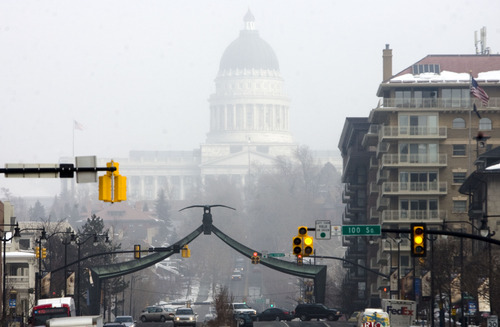This is an archived article that was published on sltrib.com in 2013, and information in the article may be outdated. It is provided only for personal research purposes and may not be reprinted.
Despite the fact that he is a good Republican, Gov. Gary Herbert would like to be able to say he is from the government and he is here to help.
It is part of the governor's sincere, if naive, desire to clean up our air by taking as many voluntary steps as possible. Despite his apparent recognition that the area's appalling air quality is both a hazard to human health and a deterrent to his primary goal of economic development, Herbert clearly favors cooperation over confrontation.
Paying polluters not to pollute could be seen as paying thieves not to rob banks. It's something they should do without being bribed. But helping cash-strapped school districts, as well as small businesses that might have to close because they can't afford to comply, is a proper use of taxpayer funds. It will help everyone.
Herbert is proposing $18 million worth of assistance and programs designed to take a bite out of some of the sources of northern Utah's disgusting air pollution.
The biggest chunk of that plan — included in his proposed $13.3 billion state budget — would go to help area school districts upgrade their fleet of buses.
Changing many of those buses from older-style diesel engines to either cleaner, advanced diesel or natural gas is an example of a relatively straightforward thing that government can do to address the problem. It is also a long-term money-saver, as natural gas costs less than diesel fuel.
Also included is a fund to make grants to small businesses to retrofit operations known for their chemical emissions — auto body shops, furniture makers.
There are some enforcement provisions. Herbert wants $800,000 to beef up the Division of Air Quality's inspection force, people whose job it is to look for violations of pollution standards that range from burning wood on no-burn days to leaking gas from industrial and oil drilling operations.
The governor's plan should not just be approved by the Legislature. It should serve as a baseline that lawmakers can use to bid up the state's efforts to clean up our air.
What is sadly, if predictably, missing from this plan is any real effort to go beyond offering help and get into making the demands that a civilized society has every right to make.
Utah law is still stuck in the ridiculous position of specifically prohibiting state regulators from imposing air quality standards that are more stringent than those laid down by the federal government. That is a deference to the feds that is unusual for, and particularly harmful to, Utah.
Grants and loans are fine as far as they go. But it is past time for some serious hammers.



